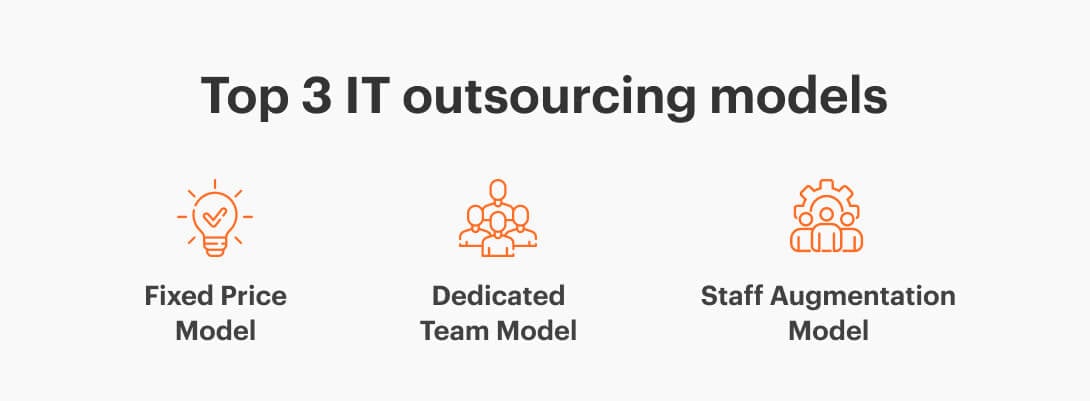The IT outsourcing market has stupendously increased due to the uncalled-for pandemic that had hit us all. Though most of the industries saw a downturn, fortunately, the IT industry managed to continue flourishing. In fact, the operations have accelerated as the pandemic has faded off because most IT businesses went offshore and remote due to the physical unavailability of the workforce but the work continued. This approach has rather led to the exploration of global talent and has resulted in huge savings for IT businesses, meanwhile also improving the competitiveness of resources. For small businesses who have just sprouted from their shell or big enterprises, outsourcing their services can be of huge benefit. Well, if you are not aware of how it all works, let us give you an insight.
What is IT outsourcing?
IT outsourcing is the handing over of the operations, project, or task to a completely different software development company. A business can hire a third party company to delegate the requirements which could be:
- Custom software development
- MVP
- Software testing
- Cloud computing
- Mobile and web application development
- Maintenance or support
- Data science
- Blockchain consulting
- Internet of Things (IoT)
Well, outsourcing not just saves time and money but also gives a competitive edge to your business because you are able to focus on the core functions. To understand outsourcing more deeply, here are some of its types that you need to learn about before outsourcing your business.
Types of outsourcing
Knowing the types of outsourcing is essential to understand how outsourcing works for different kinds of businesses.
1. Onshore outsourcing
Onshore outsourcing is the recruitment of resources within the country, though from outside the organization. Also known as domestic outsourcing, this practice has seen an unprecedented rise in organizations that are trying to reinstate their operations to their homeland. Less traveling expenses, similar culture, matching time zones, and easy compliance with legalities are some of the major advantages that onshore outsourcing ensures.
2. Offshore outsourcing
Offshore outsourcing is the process of collaborating with an organization, basically, a third party that performs all the functions in a different country at a lower cost. Mostly the work is delegated to developing countries because of lower development charges. However, that doesn’t mean there is any compromise on the quality of work because offshore companies usually have the best talent to showcase their work to foreign clients.
3. Nearshore outsourcing
Nearshore outsourcing is the process of transferring some of the operations or tasks to an adjacent location or nearby countries that fall under the same time zone. When the operations go nearshore, it is easier to communicate and travel to handle the operations.
4. Cloud computing based outsourcing
Outsourcing that fully functions online i.e. from making a deal to rolling out the project is known as cloud computing-based outsourcing. It encompasses models like – Software as a Service, Platform as a Service, and Infrastructure as a Service.
Now that you have learned about how many types of outsourcing an organization can go for, we would also like to get you acquainted with the Outsourcing Models.

Top 3 IT outsourcing models
1. Fixed Price Model
Fixed Price model is the one where the client hires a third party to execute a part of the work that has been already planned and the team is paid for the particular stint on a pre decided amount. This model involves explaining the requirements to project managers and business analysts who will be solely responsible for creating a development team as per the project requirements.
Pros:
- Transparent timelines
- Easy team formation and quick execution
- Quick hiring process
- Saves time
- Entire responsibility on PM and Business Analyst
- No micromanagement
Cons:
- Strict deadlines
- Not much control over the project
- The result may or may not meet best practices
2. Dedicated Team Model
In a dedicated development model, remote developers are hired full-time through a software service provider in the offshore country. These developers form a completely separate development team specifically to roll out the project. In a dedicated team model, the technical team hired for carrying out the project has the maximum input and acts as a product advisor. This model suits startups, long-term projects as well as projects with multiple requirements. Also, if you have to build MVP and market it, a dedicated team is the best to get your work done successfully.
Pros:
- Better control over the development process
- Working with highly experienced talent
- Increased flexibility
- Final product meets the industry standards
Cons:
- Tedious hiring
- Have more responsibility
- Time zone differences
- Communication barrier, at times
3. Staff Augmentation Model
Staff augmentation is an outsourcing service wherein the in-house team is extended with third-party resources that are highly experienced and specially hired to complete the project. It is an easy scale-up and scales-down kind of model where the technical staff can be hired on-demand and is reduced when the demand is satiated. This kind of model is best suited for short-term projects.
Pros:
- No need for hiring a complete team
- Can scale up with as many resources as you want
- Quickly fill up resource dearth
Cons:
- More time-consumption in onboarding
- Slightly tiring to find the right service provider

Major benefits of IT outsourcing
Outsourcing provides multiple benefits from offering a global talent pool to reducing the development cost. So, get a brief idea below as to how IT outsourcing proves to be advantageous for your organization.
#Highly cost effective
The outsourcing model is more cost-effective because you can simply avoid the cost of IT infrastructure. You also save on recruitment and training costs that take a major chunk of the company’s spending. Moreover, the resources you hire from developing nations cost you way cheaper than what you get in developed countries.
#Accessibility to worldwide pool of talent
Hiring from across the world gives you wider access to industry talent. Your search is not limited to a specific region and hence it is easier to get the most experienced professionals from various nations worldwide. As an added advantage, a developer from a different country comes along with a variety of perspectives. If their perspective looks effective and more profitable to your business, one can very well implement their ideology and way of working to get the most benefits.
# Increased flexibility
Outsourcing the project brings more flexibility. Even the most planned projects may get delayed due to certain updates or last-minute changes. There could be a time crunch due to a change of plans therefore while finding a suitable service provider, you must ensure that they are flexible enough to adjust to such changes.
#Quick project time to market
When you outsource your project you get immediate technical help which accelerates the time spent on bringing the project to market. All you need to do is hire an offshore development team and leverage the skills they have to quickly roll out the project. The added advantage of having a project outsourced to a dedicated development team is they have an entire team ready with the right skills so, it’s just the requirements that are needed to be clearly defined and the budget.
#Latest tools and technologies
When you outsource a project, the dedicated team that you have hired comes with the latest technologies and leverages different tools. They are usually acquainted with the latest technologies trending in the industry and could create the required product that is technologically advanced.
Major challenges of outsourcing in India
Communication barrier
Unclear communication can be a huge setback to delivering thoughts clearly. It brings a barrier between the team members and the vendor because of the difficulty in comprehending the ideas.
Quality that doesn’t match standards
The selection of vendors has to be absolutely meticulous because not all outsourcing service providers are reliable enough to offer premium quality services. Ensure that you choose a vendor that has good experience in the industry and has developed & delivered multiple projects.
Time zone differences
Different time zones can be a major communication barrier that could directly affect the agility of the outsourcing partner in responding to cyberattacks or server outages. For ideal risk management, the service providers therefore must have a team that actively responds to threats.
Compliance issues
A business can become non-compliant if it doesn’t follow GDPR guidelines or breaks any regulations stated in the document. This applies to the service provider as well with whom the company is working. If the third party fails to follow the regulations, your business can be at risk.
Why to IT outsource to India?
Choosing the right outsourced IT services provider significantly impacts the future of your project and when it comes to outsourcing your project, India always remains on the tip of your mind. Here are the top reasons why companies must outsource to India.
1. India houses the maximum talent pool
India has become the hub for IT talent and it has the best developers at competitive prices with technical prowess in AI&ML. Developers in India are highly experienced and well-trained to handle critical projects. Moreover, with Indian team members, one doesn’t face a language barrier because the majority of Indian techies communicate in English.
2. Quality is at par
Well, if you are working with an Indian company you don’t need to worry about their authenticity because most of them are CMMI Level 5 and ISO-9000 certified. Since the talent pool is vast and easily accessible, all you have to do is find a reliable technology partner that is well-known for its services.
3. Lower development rates
Project budget is the main concern why companies go for outsourcing. Indian developers charge reasonable rates compared to the developers in the US or other parts of the world. Usually, the developers charge $25-30 compared to $60-70 in the UK and Europe. In fact, most Indian companies give you multiple hiring models to choose from.
4. Competent market
The market is extremely competitive for software development services. You get multiple options to choose from as per your business requirements which means it is easier to compare the quality and prices to get the best deal.
5. Favorable government policies
The Indian government strongly supports its IT industry and offers many tax benefits to the companies outsourcing services to India. In fact, the Indian government is working hard to fuel the IT industry so they can deliver the best projects and support to the developed nations.
How to find the right outsourcing company in India?
- Pick the right technology partner by going through the work portfolios. Check their client testimonials and consult the company’s customer support services to get clarity on their support services.
- Evaluate the company’s competency and commitment toward their clients, their work culture, and ethics.
- Make sure the service provider you have planned to go with understands your business completely and is well-versed with the industry.
- Once you have finalized the vendor, determine the outsourcing model you would want to go with. Whether a fixed price model will suit your requirements or a dedicated team model? It is essential to determine the services you would require as per your project needs, beforehand.
- Define your expectations clearly to avoid any conflicts. Get a written commitment to settle and set boundaries before getting into any kind of legal deal.
Top companies to outsource in India
#Deloitte
Deloitte is an outstanding audit, consulting, tax, and advisory services providing firm that has a partnership with SAP. Companies can build hybrid cloud systems, migrate from legacy databases and deploy robotic automation solutions. In collaboration with Oracle, Deloitte can also offer cloud-focused solutions for businesses.
#Accenture
Accenture is a renowned name in the IT industry. It offers outsourced technology services which include ERP solutions, architecture, and SAP-ERP solutions. This tech giant also provides vendor and system agnostic cloud services.
#OpenXcell
OpenXcell is also one of the sought-after players in recruitment/ hiring resources and providing mobile/web application development services. The company offers a vast pool of talent as per the client’s requirements whether it is for a limited period of time or a completely dedicated resource-oriented project where resources work proactively to complete product development.
#NetGuru
Netguru deploys agile product teams as and when needed by its clients. It helps teams in designing, building, and scaling business ideas and also supports organizations in planning and evaluating product functionality and user experience.
Finding an outsourcing company is not a herculean task but one must be meticulous in their search. To crack the best outsourcing deal and get the outcomes as per the set expectations is only possible if you choose the best outsourcing partner with a well-established name in the industry.








